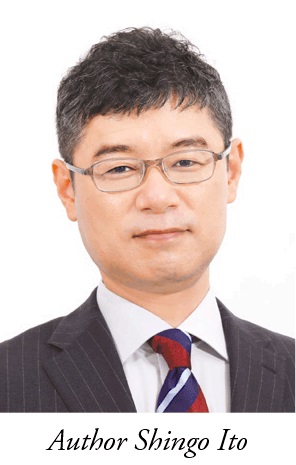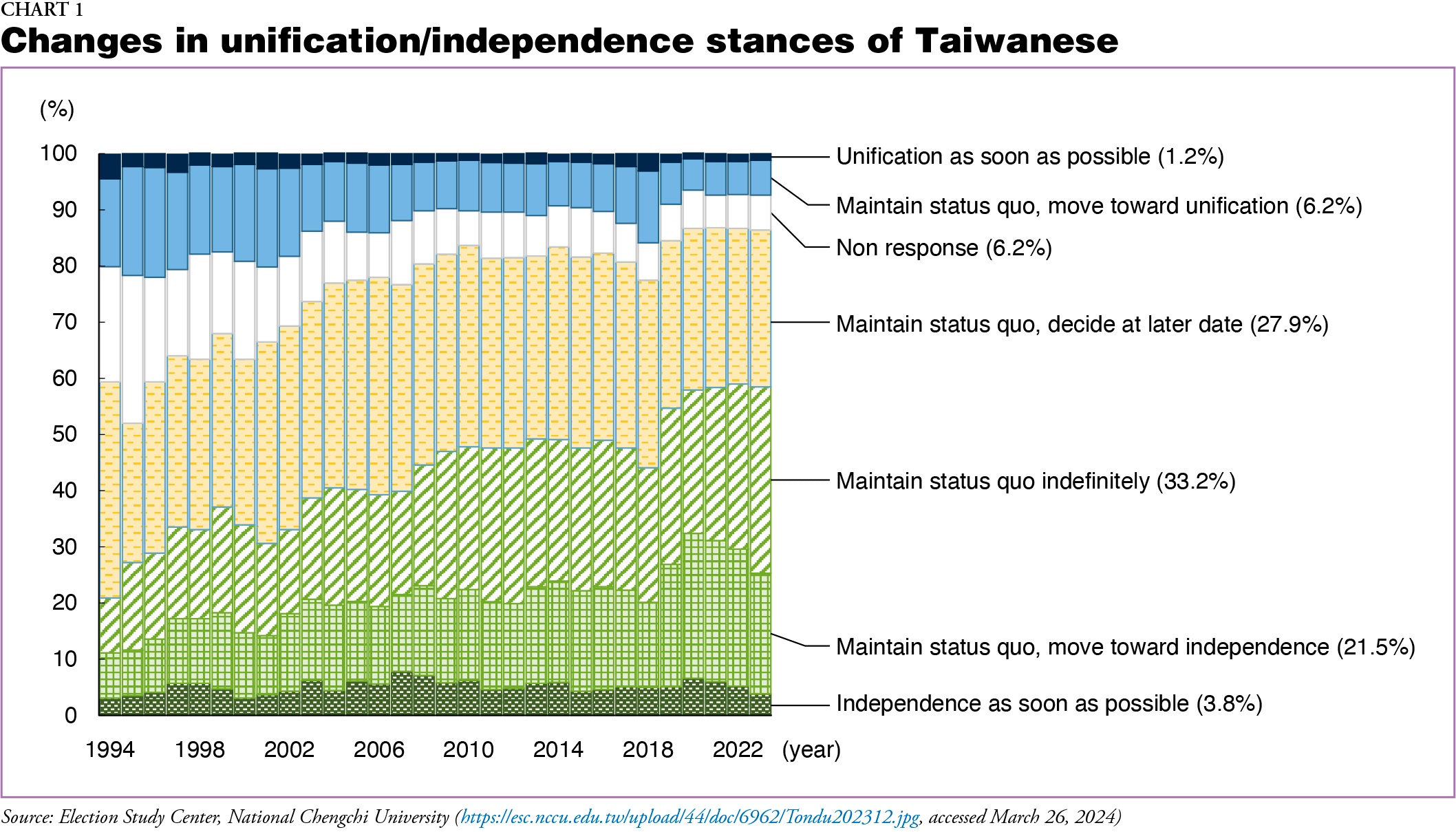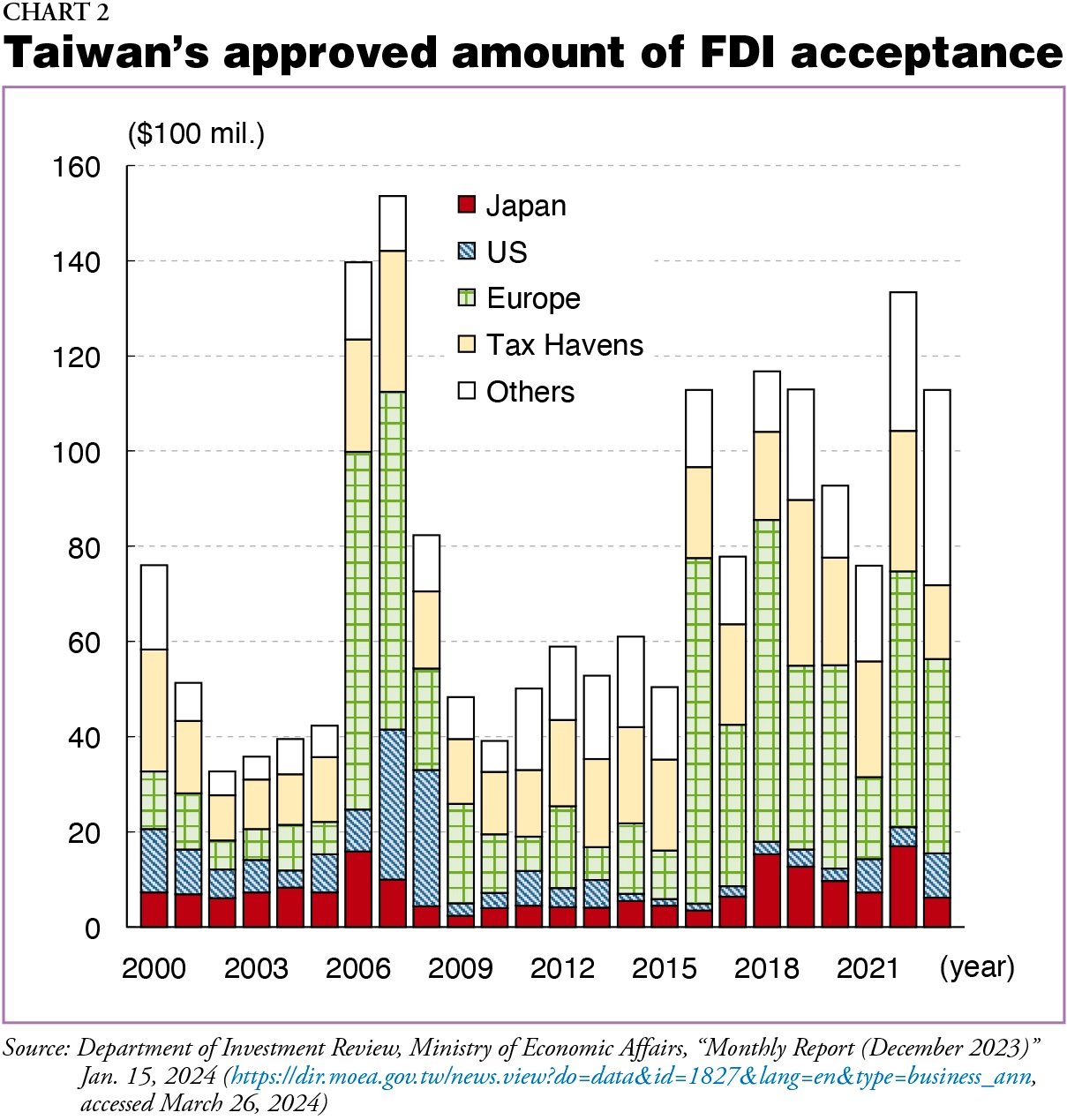HOME > Japan SPOTLIGHT > Article
Taiwan's Presidential Election & Future World Affairs
By Shingo Ito

Following Russia's invasion of Ukraine in February 2022 and China's large-scale military exercises around Taiwan in August of the same year, concerns regarding a possible so-called Taiwan contingency have intensified. Against this backdrop, Taiwan held a presidential election on Jan. 13, 2024, and Vice President Lai Ching-te of the Democratic Progressive Party (DPP), whom China had been wary of as an independent Taiwanese leader, was elected as the next president of Taiwan. This article aims to examine the potential trajectory of the cross-strait relations post-Taiwan presidential election and assess the potential implications for world affairs.
China's Wariness of Lai
Prior to the presidential election, a spokesperson for the Taiwan Affairs Office of China's State Council called Vice President Lai Ching-te a "stubborn Taiwan independence agent", a "troublemaker" and a "war maker". This portrayal aimed to dissuade Taiwanese voters from supporting Lai by suggesting that his election would not foster peace but rather escalate tensions into warfare, and would not promote prosperity but rather result in regression. There are a number of theories as to the reasons for this harsh assessment of Lai, but it is often explained that the main reason for China's strong pre-election wariness of Lai is that in September 2017, when Lai was premier of the Executive Yuan, he told the Legislative Yuan (equivalent to the National Assembly) that he was a "pragmatic Taiwan independence activist".
Peaceful Unification Policy Without Commitment to Renounce Use of Force
Although Lai won the presidential election, China has repeatedly stated since the election that peaceful reunification is its basic policy. Such statements were made possible by the fact that the DPP failed to achieve a majority in the presidential election and in the legislative elections. Lai garnered only 40% of the votes, while the combined vote shares of candidates prioritizing dialogue with China, such as Hou Yu-ih, the New Taipei mayor from the Chinese National Party/Kuomintang (KMT) and, and Ko Wen-je, the chairman of the Taiwan People's Party (TPP), amounted to 60%. The DPP also failed to gain a majority of seats in the legislative elections held the same day, and became a minority ruling party.
Voter interest in civilian issues was reportedly high in this election. Specifically, these issues included the difficulty of acquiring housing and the sluggish growth of real wages. Many pointed out that policy toward China was not the only major issue.
However, a spokesperson for the Taiwan Affairs Office of China's State Council assessed the election results in the context of cross-strait relations, and said the results show that "the DPP is not able to represent the mainstream popular will on the island." In addition, it said it will "work with Taiwan's political parties, organizations, and people from all walks of life to promote cross-strait exchange and cooperation, deepen cross-strait fusion, promote Chinese culture together, promote peaceful cross-strait relations, and advance the great task of national reunification" and "win the future of peaceful reunification with the utmost sincerity and effort." Although China has not renounced the possibility of using force, this can be interpreted as a message to those inside and outside Taiwan that peaceful unification is still possible without resorting to military force.
The basic policy of peaceful unification is believed to be due in part to the fact that China does not have sufficient military power, including the ability to effect a landing on the island, to achieve unification through the use of military force. Moreover, China would have to make tremendous sacrifices if it were to attempt unification by force. In addition, China is currently facing a number of economic challenges, including the real estate market and the restoration of local finances. In order to restore business and consumer confidence and stabilize its economy and society, it is also necessary to stabilize its external relations, particularly its relations with the United States. These circumstances may also be the reason why China is trying to adhere to peaceful unification as the basis of its policy toward Taiwan.
Lai Likely to Cautiously Manage Policies Toward China
On the other hand, Lai is also likely to manage his policy toward China cautiously, while maintaining and strengthening Taiwan's autonomy. Lai's perception of Taiwanese sovereignty, like that of his predecessor President Tsai Ing-wen, differs significantly from that of China. The Chinese side upholds the "One China principle", stating that there is only one China in the world, that Taiwan is an indivisible part of China, and that the only legitimate government representing China is that of the People's Republic of China (PRC).
In contrast, Lai recognizes that "the Republic of China [ROC] (Taiwan) is already an independent sovereign state", and has pledged to continue to uphold (a) a free and democratic constitutional system, (b) mutual non-subordination between the ROC (Taiwan) and the PRC, (c) resistance to annexation or to encroachment of sovereignty, and (d) determination of the future of the ROC (Taiwan) in accordance with the will of the Taiwanese people. This is the status quo that Lai will seek to maintain across the Taiwan Strait.

Lai has long stated that there is no need to declare Taiwan's independence anew, and Taiwanese voters are also strongly inclined to maintain the status quo. The total response rate for "maintain status quo, move toward independence", "maintain status quo indefinitely", "maintain status quo, decide at later date", and "maintain status quo, move toward unification" reached 88.8% in 2023, indicating that the overwhelming majority of Taiwanese voters favor the status quo (Chart 1). By contrast, only 3.8% of respondents in 2023 said that Taiwan should "become independent as soon as possible". In order to solidify his support not only from Taiwanese voters but also from the US, Lai is likely to refrain from announcing policies that have a strong independent Taiwanese flavor. In fact, on Jan. 13, 2024, when the election results were revealed, US President Joe Biden stated that "We do not support independence" for Taiwan.
Judging from the circumstances in both China and Taiwan, it is reasoned that the probability of China attempting unification through military means during President Lai's term is low.
China's Continuing Unification Offensive
However, this does not mean that China's unification offensive against the incoming Lai administration will weaken. The general assessment in Taiwan is that China will continue to exert pressure on the DPP administration. For example, it is believed that China was behind Nauru's breaking of relations with Taiwan in January this year. This breaking of relations has reduced the number of countries officially recognizing Taiwan to 12.
In the same month, China changed the route of commercial flights through the Taiwan Strait without consulting Taiwan, and since February vessels of the China Coast Guard have regularized patrols within the prohibited and restricted waters around Kinmen Island, which Taiwan claims jurisdiction over. These actions are perceived in Taiwan as aimed at undermining Taiwan's effective control over the island.
China's military intimidation of Taiwan also continues. Chinese military aircraft have continued to fly over Taiwan's vicinity since the election, although in smaller numbers than during Lai's visit to the US in August 2023 and when US vessels crossed the Taiwan Strait in September of the same year. Some of those military aircraft continue to fly over the median line claimed by Taiwan and its extensions. Warship activity around Taiwan also continues, and as of March 11, 2024, Taiwan's National Security Bureau Director-General Tsai Ming-yen stated that the Chinese side conducts joint combat readiness patrols by warplanes and warships every seven to 10 days. Tsai replied that he was not aware of any information that there is currently any flashpoint situation regarding war in the Taiwan Strait, but Defense Minister Chiu Kuo-cheng has stated in the Legislative Yuan that he is concerned about an accidental collision.
Possibility of Further Pressure
On May 20, Lai will deliver his inaugural address, in which he is expected to lay out his basic policy toward China. Based on the content of the speech, the Chinese side will decide whether or not to step up pressure on the Lai administration. Lai does not recognize unification with China based on the One China principle, nor the "1992 Consensus", which China has made a precondition for dialogue, so it is easy to assume that China will not weaken its offensive toward unification. The following are some of the measures that have been identified in Taiwan as possible steps that China could take to exert further pressure.
The first is a diplomatic offensive to further reduce the number of ROC-recognized countries.
Second is the strengthening of legal pressure. For example, proposals have been made at the Chinese People's Political Consultative Conference and other forums that China should go one step beyond the "Anti-Secession Law", which stipulates that a split should be prevented, and enact the "Law on the Reunification of the Fatherland", which stipulates that unification should be promoted. The Taiwan Affairs Office of China's State Council has expressed the view that enactment of this law is unnecessary as the Constitution and the Anti-Secession Law clearly stipulate reunification of the motherland, but it is important to note that this viewpoint exists.
Third, some observers believe that intensified cognitive warfare may promote a loss of authority for the DPP government and the fragmentation of Taiwanese society and politics. And fourth is the strengthening of military exercises and training, with attention both inside and outside Taiwan then being focused on whether military exercises will surpass those that took place when US House Speaker Nancy Pelosi visited Taiwan in August 2022.
Economic Pressure & Its Impact
A fifth possible measure is the intensification of economic pressure. China has determined that Taiwan's import restrictions on approximately 2,500 Chinese products are in violation of the WTO and the Economic Cooperation Framework Agreement (ECFA), which is equivalent to a cross-strait FTA, and has suspended the application of zero tariffs under the ECFA to 12 Taiwanese products effective from Jan. 1, 2024. On Jan. 9, China's Ministry of Commerce indicated that it may further increase the number of items subject to zero tariff suspension in the future. Agricultural and fisheries products, machinery, auto parts, and textile products could become such items. But even if the zero tariffs under the ECFA were completely eliminated, the direct impact on Taiwan's macroeconomy would be limited. This is because the value of Taiwan's exports to China of products subject to zero tariffs under the ECFA accounted for only 4.3% of its total exports in 2022.
Nevertheless, the more widely the zero tariff review of the ECFA is extended, the more likely it is that it will give the impression, both domestically and internationally, that cross-strait relations are becoming increasingly strained, which could adversely affect the economies of both China and Taiwan through stagnation of investment and consumption. In addition, if China were to abolish the ECFA altogether, it could give the impression both inside and outside China that the above-mentioned "deepening of cross-strait integrated development" had come to a halt. So it is reasonable to assume at this point that China is unlikely to take steps toward the total elimination of the ECFA. In addition to the ECFA review, some observers have speculated that China may exert pressure on the Lai administration in the form of import restrictions on certain Taiwanese products, anti-dumping duties, and restrictions on exports of critical goods to Taiwan.
Lai's Possible Response to Unification Offensive
Lai's policy will be to increase Taiwan's resilience against a renewed unification offensive by China by strengthening its economic and security systems, in addition to enhancing deterrence by strengthening military capabilities based on an asymmetric strategy and strengthening partnerships with democratic countries. A typical measure for enhancing economic resilience is the continued development of the "six core strategic industries" that began under the Tsai administration. Specifically, the following industries are targeted for development: (1) information and digital industries (semiconductors, AI, 5G), (2) information security industries, (3) high-precision medical industries (biotechnology, vaccines), (4) defense and strategic industries (aircraft, warships, low-orbit satellites), (5) green and renewable energy, and (6) consumer and strategic goods industries (energy, food, civilian and medical goods, semiconductor materials and equipment, automotive batteries, active pharmaceutical ingredient). In particular, Lai has said Taiwan will emphasize the development of the "five trust industries" (semiconductors, AI, military industry, digital surveillance, and telecommunications), with the aim of strengthening Taiwan's strategic autonomy and indispensability.
In addition, he has pledged to further reduce the country's economic dependence on China by strengthening economic ties with developed countries, Southeast Asian and South Asian countries, continuing measures to encourage Taiwanese companies to return to Taiwan, and strengthening efforts to attract overseas funds and personnel.
Possibility of a Taiwan Contingency & Appropriate Responses
For the various reasons mentioned above, including the lack of military power to ensure a successful landing operation on Taiwan and the high costs involved, it is unlikely that China will attempt unification with Taiwan by force in the near future. Economic activities in Taiwan have so far continued without major impediments. For example, the amount of foreign direct investment approved by Taiwan has remained at a high level (Chart 2), and there has been no large-scale outflow of capital. Construction of advanced semiconductor factories in Taiwan also continues to be active. Under these circumstances, overestimating the risk of a Taiwan contingency and curtailing economic activities could destabilize not only Taiwan but also the economies and societies of East Asia.

Of course, the possibility of armed conflict across the strait, including accidental conflict, has not been completely eliminated. It is of utmost importance to strengthen efforts to prevent such risks from materializing. It is important for the region to share the understanding that the network of division of labor that extends across both sides of the strait, throughout East Asia and the Indo-Pacific is the key to prosperity and stability in the region. The waters surrounding Taiwan are also an important global shipping route. Some 50% of the world's cargo ships and 90% of the world's large container ships sail through the waters around Taiwan. Maintaining the stability of the Taiwan Strait is of vital importance to the global economy. The significance of this is clear when one recalls the disruption to supply chains and price increases caused by the coronavirus in the semiconductor, IT equipment, and other product sectors.
It is also imperative to raise the level of international trade rules, strengthen compliance with them, and rebuild dispute resolution mechanisms. This is because the formation of norms, while indirect, could lead to discipline and stability in cross-strait relations. In particular, it will be necessary to hasten the formation of standards in the Indo-Pacific region to prevent the political use of economic dependence.
Note: This is the author's personal view and does not represent the official position of any organization.
Article translated from the original Japanese by Naoyuki Haraoka.
(2024/05/20)
Shingo Ito
Shingo Ito is a senior economist of the Institute for International Economic Research. His primary areas of research are the Chinese economy, the Taiwanese economy, and Cross-Strait economic relations.

Japan SPOTLIGHT

- Coffee Cultures of Japan & India
- 2025/01/27
























